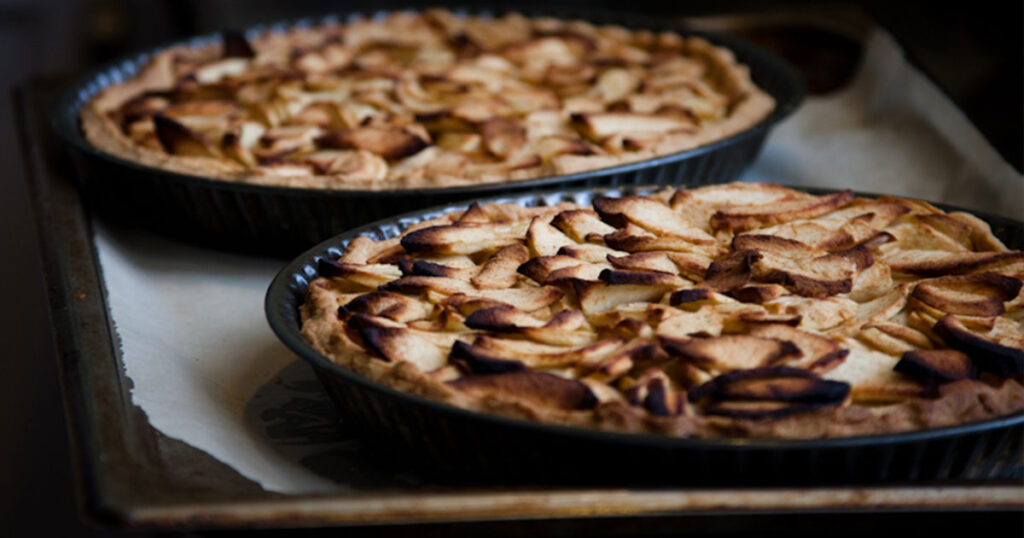
A character in a short story by Amy Bloom explains to her grown daughter that she was able to love two men at the same time, and that the two men accepted this and even loved each other. They still do. Neither man is worried about the love the woman gives to the other because his own portion isn’t diminished. “Love is not a pie,” the mother tells her daughter. Plenty exists for everyone.
I encountered the story, called “Love Is Not a Pie,” many years ago in the Best American Short Stories 1991 anthology, and I must have sighed in satisfaction: real love is not limited and not limiting. I’m not so sure anymore. In the late ’90s, I met Jacques, a Frenchman in a Spanish class I attended in Gijón. He was one of seven children, and when I expressed envy at the hoard of brothers and sisters running around the farm where they grew up, he said that seven was too many. “Why?” I asked. Not enough love for so many, he said. He was a very gentle man who had no children of his own, though I don’t remember if that was by chance or by choice. I think of the many parents I know who have only one child. Why only one? Because that’s enough. Enough what? Enough to guarantee you will be looked after in your old age, or enough for the family name to be carried on, or enough just to keep you busy? Enough to show you can? Enough of a good thing? But surely it’s true that more is merrier? My uncle had four children on that principle, and he and my aunt never regretted their houseful of offspring, as far as I know. But my cousins? What did they think about sharing with their siblings?
It was the supply—my supply to give—that I was thinking about recently. My black cat was sprawled on the sofa beside me, ready for a tummy rub. My gray cat was with me, too, perched on my knee and likely, in her new, habitual grumpiness, to turn a sharp claw on poor, inoffensive Blackster or even on me should I disturb her by shifting my leg. The third, a tabby, was crouched by the heater. My cats have caused me so much trouble, worry, grief, and expense since my move to Pola de Siero two years ago that I wonder if I even love them at this point. I must, or I wouldn’t go through the motions. But do these particular motions, including a lot of traipsing to and from the vet, mean that I love them more than I otherwise would, the way you cherish what you’ve struggled for? Or am I expending my emotional store on worry, leaving myself with less love to give? I could see it working either way. For the narrator of Alice Munro’s story “The Moons of Jupiter,” there was a third way: fear of losing her child to leukemia caused her to subtly withdraw from the little girl, as if to prepare for the final separation to come. With Blackster, I have that diagnosis of leukemia. Keeping him alive is work. Has love surged, or has it retracted in shock under the bright light of reality?
When students have trouble identifying the verb form and tense in a sentence, I suggest that they think of another sentence with the same structure but a different verb. “I have eaten all the cherries,” for example, instead of “I have read all the books” because read is tricky, the infinitive, past tense, and past participle having identical spelling: read, read, and read. When you see read in a sentence, how do you know which of the three it is? Which of the triplets are you, asks a newcomer to the family, not yet familiar enough with the three girls to know the one by the fire is Betsy, the other by the window is Mary, and the girl reading under the lamp is Trish. Their places in the room and the bits and bobs lying near them signify nothing to this uninitiated guest. But a common irregular verb like eat looks and sounds different in all its forms and therefore becomes easy to analyze. When one girl is dark-haired, the second a redhead, and the third a blond wearing glasses, they are easier to keep straight.
Doing the same for my question about love, I substitute another question that might lead me to the answer. “Do the troubles that life heaps on you mean that you cling more desperately to it, or do they instead make the idea of giving it up not as awful as you had once imagined?” Would I love life better if it were more obedient and behaved perfectly and gave me no grief instead of plenty of it?
Even better, would I love my morning coffee more if I could obtain my first delicious cup with a snap of the fingers instead of the make-coffee-heat-milk-whip-up-froth routine? Or would I love it less? Or would I just have another cup while I luxuriate in having the time to wonder and the place on the sofa in which to sit as I do, with my three cats in attendance?
I believe I would love my coffee less if it were easier to obtain. But I would also love it less if it were more trouble. My morning coffee is, I conclude, the perfect balance of effort and reward. I wouldn’t change anything. “Ella,” I say, when the grumpy cat on my knee slashes at Blackster, “love is not a pie.” Then to Blackster I say, “And life is no piece of cake.”

